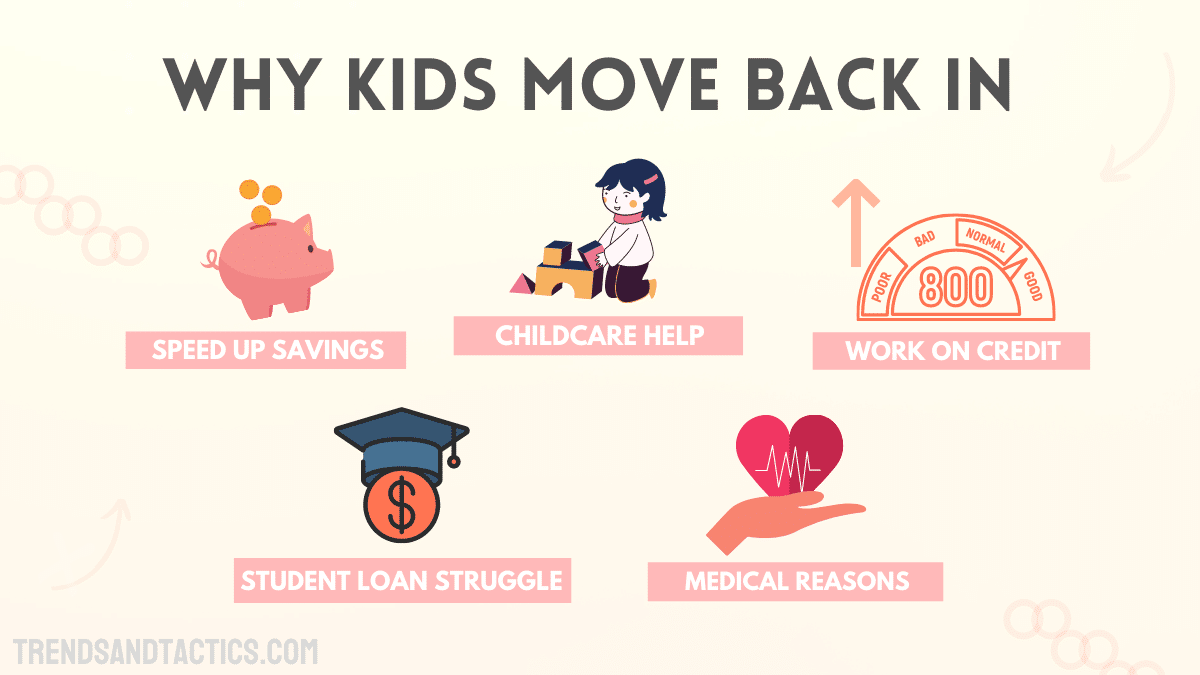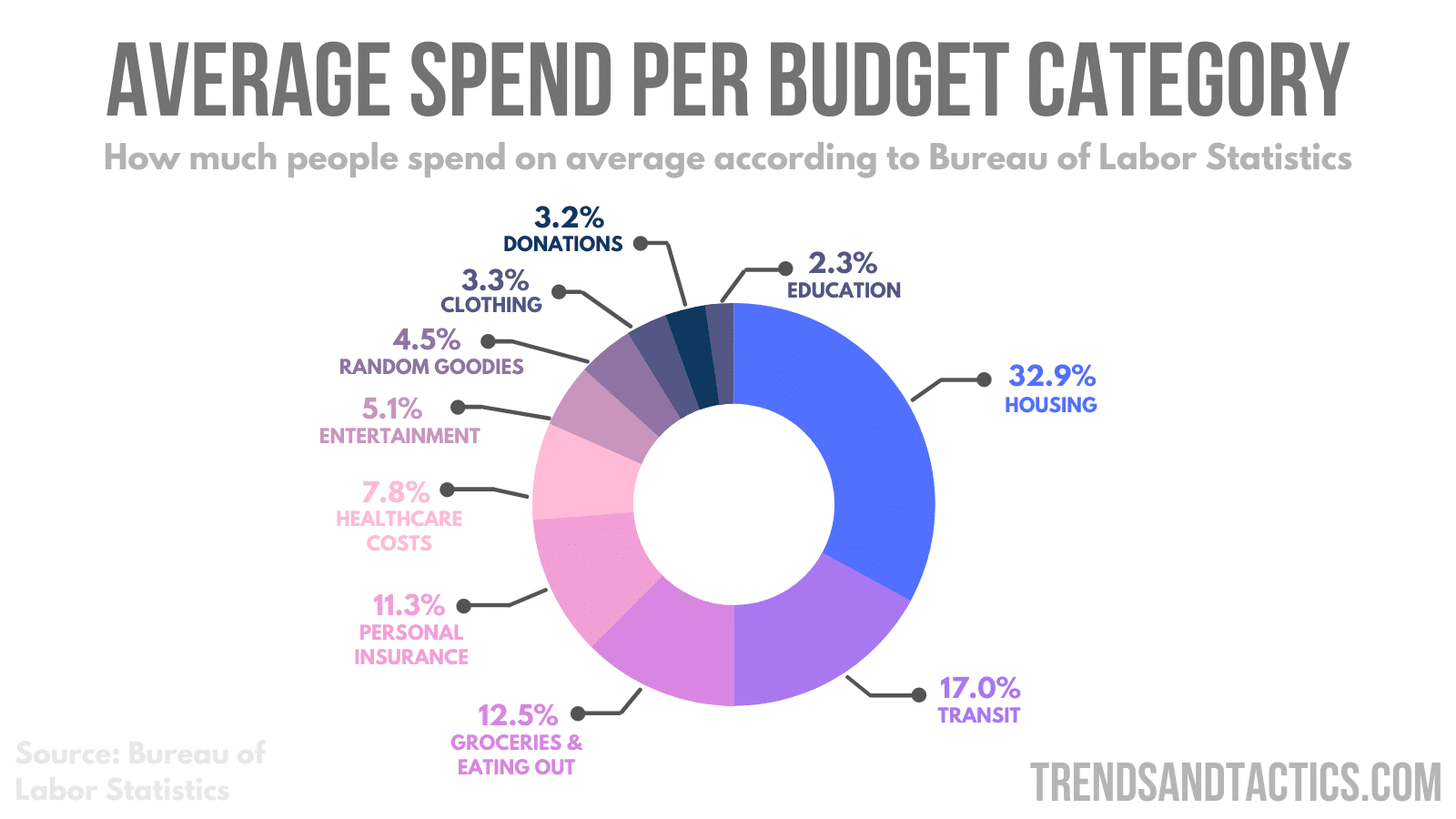In July of 2020, over 52% of adults between the ages of 18-29 lived with one or both of their parents.
Although the number has dipped slightly since then, many married young people are finding themselves living with parents after marriage to save money.
Here are the facts to consider if you’re thinking about moving back into the nest.
Why People Live With Parents After Marriage

Living with in-laws can be a large change to get used to, especially at a point in time where most people want space to be alone with their partner, but it’s often an awesome decision that helps them move their lives forward more smoothly.
Even if you did a great job budgeting in college or learned how to save money fast, living with parents for a little can still be a smart money move.
The main things that drive people to move back in with their parents after they tie the knot are:
- Saving money for a house
- They already have children together and need help with daycare
- They’re saving to move and find jobs elsewhere
- Working to rebuild credit scores for housing
- Trying to find better-paying work before finding a place together
- Their in-laws need help for medical reasons
- Working to pay down college loans
- Wanting to gain relationship wisdom at the beginning of their marriage
Every couple will have reasons to move in with their in-laws, but money and stability are often at the center.
If someone in one of these situations is eager to do it, and their new spouse agrees: this can be a great fit.
How to Thank Them or Pay For This Space
The idea of paying to live in the space where you or your spouse grew up may feel strange at first, but even if your parents own the home and don’t have to make payments on it: other bills exist to keep a house running.
Homeowners’ insurance, the cost of heating and electricity, internet, television, the list could go on forever.
Although you could decide to split all of these costs evenly to make it easier on your parents as well, that’s something you’ll have to work out with them.
Some parents offer to pay for everything if you’ll handle things like running to the store or mowing the lawn and cleaning the house- others will require a weekly or monthly rent payment instead.
This is something that should be discussed as early into the planning as possible.
Although it’s fair to barter with them and try to find a good exchange that helps everyone, be aware of your situation and don’t allow either party to take advantage of the other.
Chipping in a little bit of money from a reselling items on eBay or getting a high paying second job will go a long way.
What Are The Downsides?
Every living situation has at least one flaw. When you’re living with your in-laws, or your parents, with your spouse: those flaws can become apparent quickly.
Nothing is too big to work past as long as you come from an understanding and open mind, but these are the common problems most run into:
- Lack of privacy for intimacy, especially for the newly married
- Figuring out the relationship change between the parent and their child now that the child is an adult
- Setting boundaries for what information and experiences are shared
- Poor communication leads to resentment or anger
- The in-law spouse feels left out because they’re not related in the same way
- Lack of space and the ability to choose decor or major changes
- Common roommate complaints, like different schedules or noise
- If either couple fights, the other will, unfortunately, know about it immediately
If these aren’t handled well, they can result in major issues and even break up one or both couples. Communication is vital to work through any of these.
How Much Money Can You Save Living with Parents?
The most obvious perk about living with your parents is how much money you can save!
Housing is the #1 expense for people from a budgeting perspective, which is why moving back in with parents is on the rise.

Although everyone makes different amounts and works different hours, we’ll be working with national averages to find what could be possible for you.
On average, 49% of marriages have both spouses working, while 31% exist with only one partner working. We’ll be using dual-income relationships for these numbers.
The average American income is just over $31,000, resulting in most dual-income couples bringing in $62,000 a year.
If you’re both working, and the only bills you have to pay are the utilities or a possible small rent amount, you shouldn’t be spending over $1,000 per month on your living expenses.
This can vary if you already have children together, but most freshly-married couples don’t yet.
You should still set aside enough money to eat out occasionally and cover things like phone bills, streaming subscriptions, and entertainment, which can be another $1,000 a month.
This could allow you to save around $28,000 in a year after taxes living with parents.
Since the average house in America costs $374,000, you would have to save for two and a half years to reach a 20% downpayment: but many programs will help first-time homebuyers make the purchase.
If you want to accelerate your savings during this time, make sure you consider your food and transportation spending as well. Knowing how to save on car maintenance repairs or even how to sell your car to a junkyard can make a difference too.
Things You Can Do To Make This Arrangement Easier
You can do many things to make this living situation better: but the main one is to learn how to communicate clearly, or at least learn how everyone else in the home communicates.
If your parents aren’t open to showing when they’re unhappy about things, and they stay tight-lipped about them, talk to them about how you want to be clear about needs while you’re all living together.
Talk to your spouse and help them understand how important communication is for this to work and that they also have to work to share when things aren’t right or need help.
Regardless of what conversation you’re having, if someone might take it negatively, then take your time and work on it as a team.
You are family after all, so work on ensuring that everyone feels welcome and respected if things get tense.
What You Shouldn’t Do While Living With Parents
As with any shared living situation, there are plenty of things you can do to make things hard for each other, so it’s important to try to make things easier for everyone.
These are the top things you should avoid doing while living with both your parents (or in-laws) and your spouse.
- Talking behind backs. Open communication is key, and betraying someone’s trust by talking behind their back can hurt that relationship if they find out.
- Invading personal space or ignoring boundaries. Breaking through someone’s boundaries will make it so that they don’t trust you anymore, which can sour any living situation.
- Stealing, borrowing, or using things without discussing them first. Although these people are family, you should still have at least one conversation about borrowing or sharing items, just like you would with any other roommate.
- Starting fights for petty reasons. When people start fights over little reasons, there’s usually a different reason they aren’t willing to share. Communicate your needs instead of picking at people.
- Spend money recklessly. Your family is taking you in to help you save money or make better financial decisions. Please don’t throw this in their face by spending recklessly.
- Be loudly intimate. Every couple has physical needs. You can still enjoy those, but try to keep the volume down, or plan date nights where you have the house to yourself, or you can get a hotel or Airbnb for the evening if you want to be louder.
They’re doing a lot by welcoming you into their home, so be sure that you show that you appreciate this and work to resolve issues in ways that support everyone.
When To Know It’s Time To Move Out
Sooner or later, there comes a time when it’s time to move out!
Of course, we would all hope that it’s for good reasons, but unfortunately, there’s no way to promise that will be the case.
These are the top 6 signs it’s time to move out:
- You’ve saved enough for your down payment and can buy a home
- You’ve paid off debt or reached whatever goal you were trying to achieve while living with your parents
- You and your in-laws or parents aren’t able to have calm conversations anymore
- This living situation is affecting the relationship you have with your spouse
- This living situation is affecting the connection between your parents or in-laws
- You’re expecting a child and need more space
Not every reason is bad, but you have to be honest when it’s time to move on.
Why This Might Not Be For Everyone
This living situation may not be for everyone; it’s good to be honest about that!
If you and your in-laws don’t get along, or your spouse and your parents don’t get along before you even live together, it’s not a good idea to live together.
Talk to everyone involved and be honest before moving in.
Although this living situation can help you save money, it’s not worth it if the arrangement makes you damage or lose the relationship with your spouse or parents.
Wrapping Up
Moving back in with your parents is a huge step to make, so you must consider every portion of it carefully and talk it over with your new spouse.
Although this can be a lot to undertake, it will be a lot easier if you’re both on the same page.
Erin is a business teacher and mother of three. When she’s not in the classroom or fulfilling her obligations as an A+ hockey and lacrosse mom, she’s working on her latest article.






